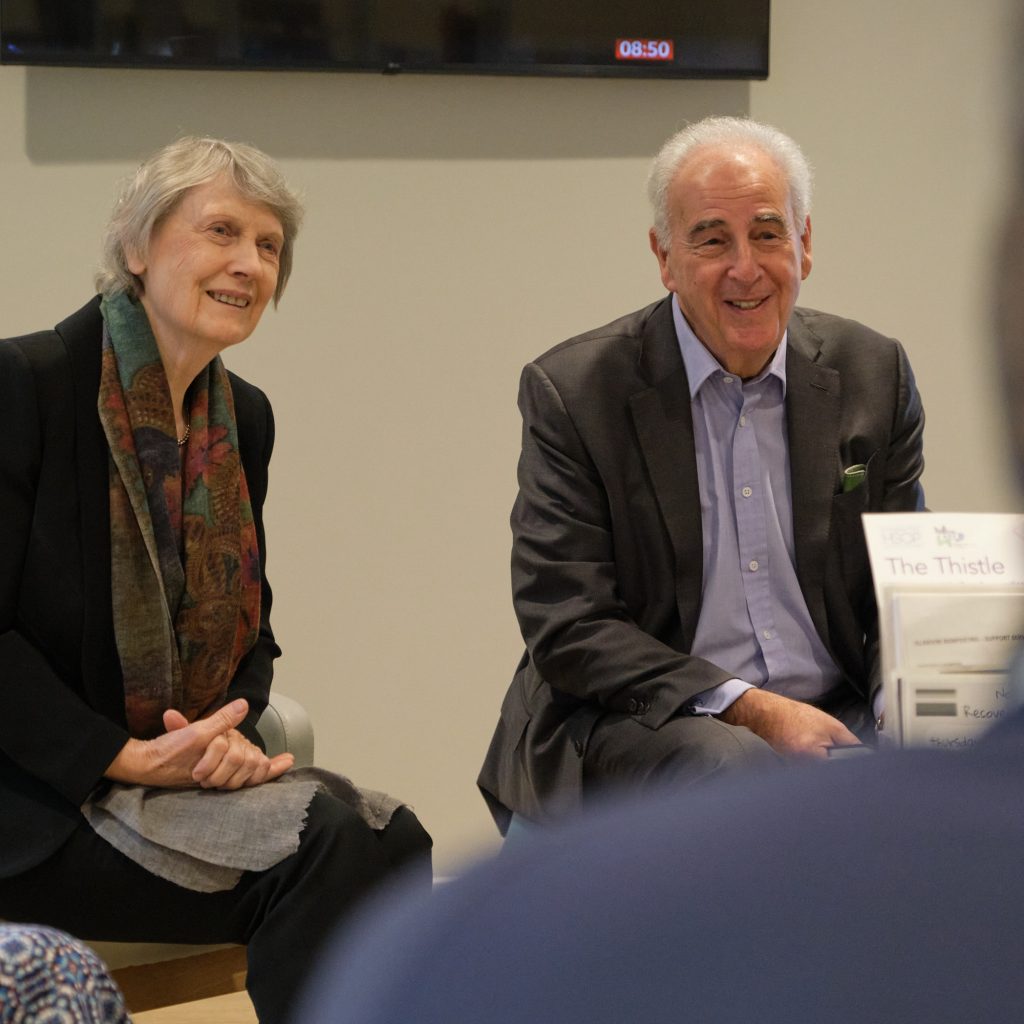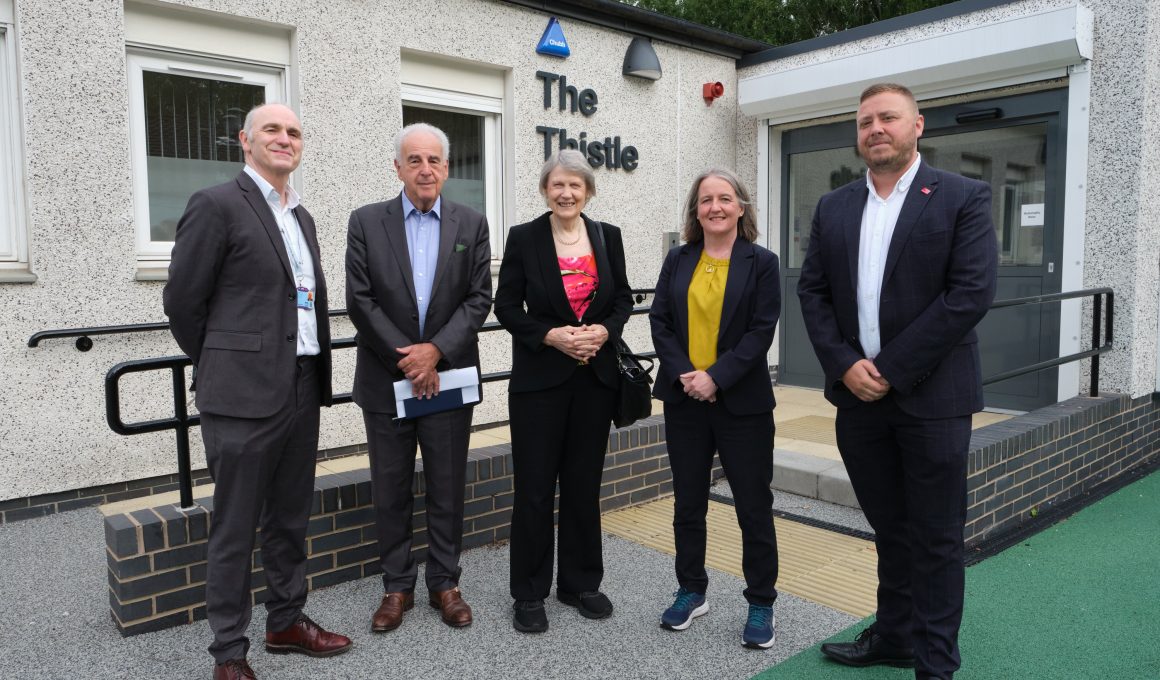Members of the Global Commission on Drug Policy met with staff and politicians at The Thistle on Thursday, July 3rd.
The “powerfully significant” visit saw Helen Clark, former Prime Minister of New Zealand, and Michel Kazatchkine, leading global health expert and diplomat, take a tour of the safer drugs consumption room.
Nearly 40 overdoses have been recorded at The Thistle since it opened in January, commissioners were told, including nine ambulance call-outs. Every person who has had a medical emergency at the facility has recovered and returned to use the service.
The commission was welcomed by Maree Todd MSP, Minister for Drugs and Alcohol Policy, and Glasgow addiction services convenor Councillor Allan Casey as well as service manager Lynn Macdonald and associate medical director Dr Saket Priyadarshi.
Safer consumption facilities and other harm reduction efforts around the world are “one hard-fought win after another”, Clark said.
“One of the descriptions we were given was something that was so potent [a recent increase across Scotland in heroin found to contain nitazenes] that people had hardly got the first injection to their arm, and then slumped, just gone right out. And they have the facilities here to help those people, not only with the naloxone, but also with oxygen.
“They’ve had to call an ambulance nine times, and the other emergencies they’ve dealt with. But these would have been deaths out there. So what’s the price of life?”
By the end of June, 348 people had attended The Thistle in a total 4,361 visits. But only 3,008 of those visits were to inject – many have been using the other services available, like laundry facilities and wound care support.
Social workers at The Thistle said the facility has also become an important point of contact for people who don’t have mobile phones to stay in touch with, for example, housing caseworkers, who can be directed to call the facility when the person can’t be reached directly.
“The challenge ahead is very steep challenge, and without facilities like this we fear the rising death toll,” Clark added. “The drugs death toll for the UK in the context of Europe is absolutely astounding, 40% of the total of the combined UK-EU total. So really it should be a wake up call for politicians in Whitehall and Westminster.
“I was a young politician in New Zealand when the AIDS crisis hit. It meant politicians had to move right out of their comfort zones and contemplate things that they would otherwise not have contemplated doing.
“When you’ve got a death by drug overdose crisis, and a synthetics crisis coming, it calls for politicians to move into zones they may not be comfortable with. But public health demands it.”

Officials have already submitted an application to the Home Office for a drug-checking service pilot at The Thistle, staff said. This would allow people to test their drugs on-site and receive harm reduction information on what they have, as well as allowing the establishment of a back-up lab to build a local and national picture of drug trends.
There is great desire for inhalation facilities to be made available at The Thistle too, but progress on this is being held up by the legislation that prohibits smoking indoors. “We’re already hearing from service users that use of the facility would increase if there was an inhalation space on site,” Dr Priyadarshi said.
The need for smoking areas is an issue shared by similar facilities around Europe, commissioner Kazatchkine said.
“It was interesting to hear their estimate of a high-risk population of around 450 or 500 people in Glasgow. You may think it’s small compared with the population of the city, but it’s a group of people at high risk of mortality.
“Secondly, it’s fluctuating. With new drugs coming in, with the risks of synthetics, with poly drug use. It’s absolutely not a fixed situation. Epidemics always start with small numbers, so we have to be very careful. And you don’t want to treat epidemics. You want to treat outbreaks that are at risk of becoming epidemics.”
Maree Todd MSP, Minister for Drugs and Alcohol Policy, said the commissioners’ visit was “powerfully significant”.
“They were integral in encouraging us to pursue [the opening of The Thistle],” she said. “It’s a real pleasure to welcome them back to see it in action. And no job is ever finished. So it’s vital to hear what they think needs to happen next, how the service could evolve, what safer consumption room experiences are in other parts of the world. It’s just really helpful.”
Todd, along with Cllr Allan Casey – Glasgow City Convenor for Addiction Services – hoped the commission’s involvement could influence more UK Government officials to embrace harm reduction efforts around drug policy.
The Thistle is also an important example of involving people with lived and living experience in the design of services, the MSP added.
“It’s a vital part of the way that we work in government nowadays,” she said. “My experience as a minister has been that lived and living experience helps us get policy and legislation right in the first place.
“One of the challenges I face daily as a minister is the gap between the ambition and what actually happens on the ground. The input of people with that experience is a really important part of holding our feet to the fire around delivery.”
-Hannah Westwater

